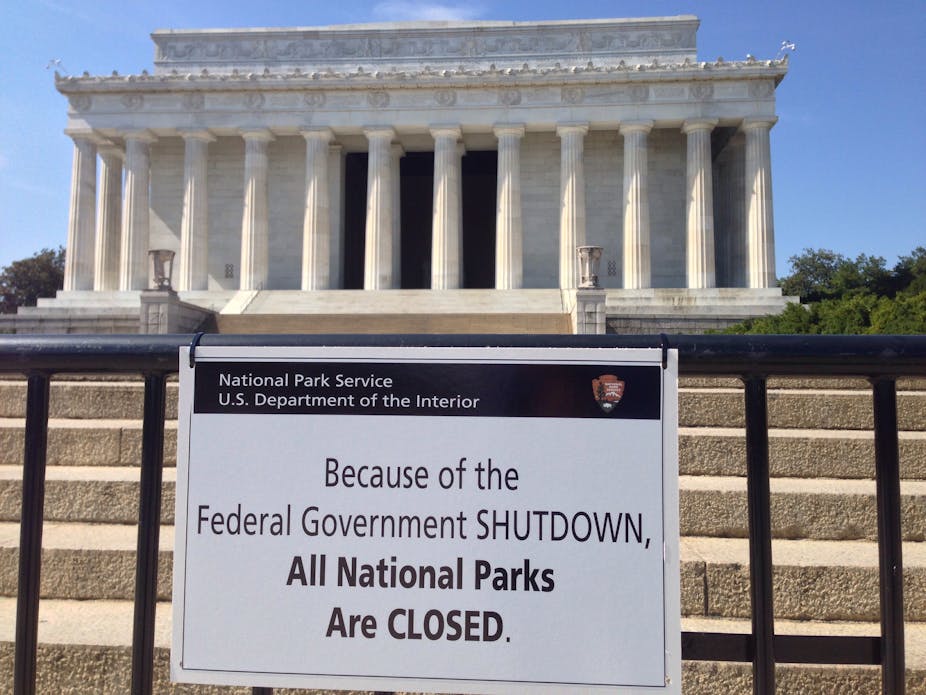As a researcher funded by the US National Science Foundation (NSF), since October 1, I’ve known that I will be not be receiving my monthly fellowship. This has meant that my work, investigating genes’ role in vertebrate development, has been put on hold.
Like many other scientists faced with the US government shutdown, I was not told how to prepare for this, or if any contingency plans would be offered. Because of furloughs, officials at the NSF are unreachable for help. National parks, museums and research institutes are all shut, with scientists and staff sent home. This means suspension of many critical aspects of research.
Now I have to continue my work without financial support, living and working in London with no salary until funding is restored. Because I’m in the UK, my host laboratory does not rely on US grant money to operate, and I continue to have access to equipment and supplies. Other researchers have not been as lucky: 73% of employees at the National Insitutes of Health (NIH) in Bethesda are unable to remain at the bench during the shutdown, stalling advances in biomedical research. The minimal staff allowed to stay are able to keep crucial materials like cell lines alive, but worries linger for what will happen when the limited supplies run out.
As the budget impasse enters its third week, the list of programs and facilities affected is growing. Researchers in health sciences worldwide have probably noticed the effects on critical tools such as PubMed, an online database of more than 23 million journal articles, currently being operated with minimal staff. Geologists and meteorologists must make do with limited resources, as only systems with a direct impact on health and safety remain accessible. If the shutdown isn’t dealt with before October 18, astronomers will be unable to use telescopes at the National Optical Astronomy Observatory in Arizona to scan the skies.
Researchers submitting grants for funding find themselves in a holding pattern, uploading their proposals without acknowledgement. Alec Davidson, associate professor of neurobiology at Morehouse School of Medicine said, he is “not sure what will happen with the October 16 deadline for the R21 grant (a smaller, shorter-term grant than the standard R01)” and has received “no response from program officers” at the NIH.
The grant review process is also suspended until further notice. Those who have already completed early stages of submission are seeing their assessment and scoring dates being postponed. Even researchers who secured funding before October 1 are not immune to the effects of the shutdown and are unable to activate their grants to receive funds. Again, those who could address these concerns have been furloughed and are inaccessible.
Outside the lab, the world of science publishing is also beginning to feel the negative effects of the shutdown. Peer-reviewed journals rely on volunteer scientists to evaluate the quality of the research submitted to be published. Journal editors now find that they are unable to reach their reviewers, as non-essential researchers are not allowed to reply to email or phone calls. As manuscripts are unable to be reviewed and have revisions addressed, there is a concern that science journals will face a delay in publishing. For the time being, it seems that there are enough papers and funded researchers that the system won’t grind to a halt just yet.
The shutdown is having a real impact on scientists’ lives. The entire US Antarctic research program was cancelled because of it. The story of chemical oceanographer Jamie Collins was widely covered in the media last week. A third-year graduate student, he had travelled from Boston to the Palmer Research Station in Antarctica, only to be told not to leave his ship. The field expedition he had been preparing for over the summer was cancelled because the NSF cannot support the research stations without a budget. He will be returning to Boston without collecting necessary data for his PhD project.
Graduate students, like Collins, and postdoctoral researchers, like me, the so-called work horses of academic science, rely on government granting bodies to support our training. Our future in science often depends on the quality of research we generate during this critical time. If we are unable to perform experiments and collect data that we need to publish our work, how can we be expected to advance our careers? Talented young researchers are taking note of the value that the US Congress is placing on science by failing to fund the government and may look elsewhere. We can only hope the disheartening message of “Science - Closed Until Further Notice” will change before it’s too late.

